Highlights of Tuesday at Supreme Courtpublished at 07:34 GMT 7 December 2016
Wednesday's session begins at 10:30 GMT
Supreme Court case ends with reminder it's not about stopping Brexit
Government appealed against ruling it needs MPs' approval to trigger Brexit
Judgement is expected in January
Watch highlights of each day via clips above, or scroll down to see how events unfolded
Jackie Storer and Alex Hunt
Wednesday's session begins at 10:30 GMT
 Image source, PA
Image source, PAShadow Brexit secretary Keir Starmer said of the government's amendment to Labour's motion on Article 50: "This is a welcome and hugely significant climbdown from the government."
"For the last two months Labour have been pushing the government to put their plan for Brexit before Parliament and the public. Without that plan, we have had unnecessary uncertainty, speculation and a running commentary on the government's likely approach."
 Image source, Getty Images
Image source, Getty ImagesFormer Conservative minister and prominent Remain campaigner Anna Soubry has welcomed the government's decision to accept Labour's Opposition Day motion calling on it to publish its Brexit plan prior to invoking Article 50.
She said it was "very good news" and showed the government "really is listening to all voices". MPs "don't want the detail" or a running commentary, just the "guiding principles" of the government's negotiating strategy, she said, praising Labour's "very responsible" motion.
"We're moving in the right direction, which is that Parliament should have these debates and Parliament must trigger Article 50," she said. "The government need have no fear - we will vote to leave the EU because we have accepted the result of the referendum. But now we need to get the very best deal for our country."
The Supreme Court is told Parliament could have made the EU referendum legally binding but chose not to.
Read MoreNo 10 agrees to publish a plan for Brexit before triggering Article 50, ahead of a Labour debate.
Read More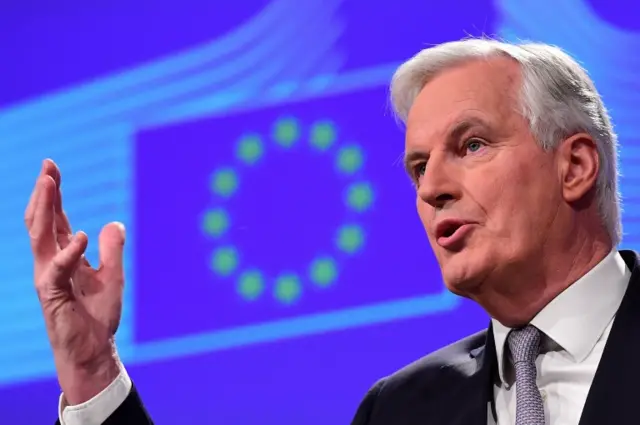 Image source, AFP
Image source, AFPIt's been a very busy day on the Brexit front both inside and outside the Supreme Court. Here's a summary of the main headlines.
 BBC Radio 5 live
BBC Radio 5 live
When it comes to triggering Article 50, should MPs back the majority view of the people who voted in the referendum, or the way they think is right?
BBC Radio 5 live put four MPs who were out-of-step with their constituency on Brexit face-to-face with some of the people they represent.
 Laura Kuenssberg
Laura Kuenssberg
BBC political editor
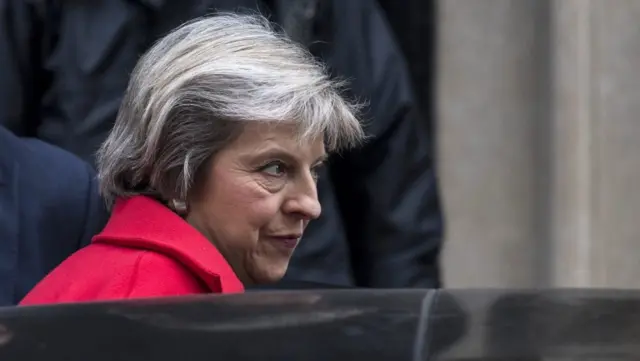 Image source, EPA
Image source, EPAReacting to the government's climbdown over publishing its Brexit plan before invoking Article 50, one of the Conservative MPs who were considering voting against the government in a debate on Wednesday have now told the BBC: "This is a significant victory as the government has undertaken to produce a plan which parliament will debate."
"We need to be clear that legislation should be drafted to be passed by Parliament so we can then authorise the government to trigger Article 50."
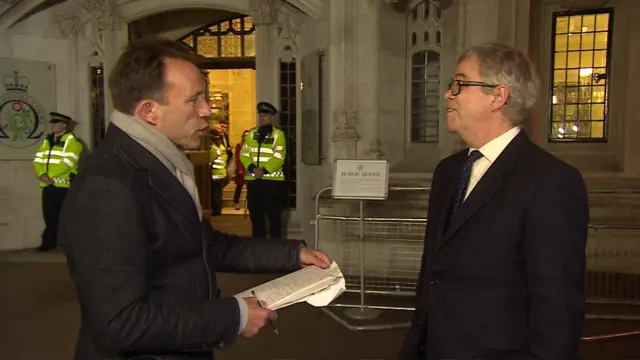
David Greene, a member of the legal team representing hairdresser Deir Dos Santos - who is also challenging the government alongside Gina Miller - says the Brexit case is "all about process and not about in or out".
"We know there is a lot of passion attached to that but it is all about the law."
The lawyer says Mr Dos Santos - whose counsel will set out his case on Wednesday - has kept a "lower profile" than Ms Miller in recent months.
But he says all respondents in the case have been subjected to abuse on social media and he bemoans the fact there have to be security guards in a civil court.
Quote MessageHe has kept rather a lower profile to protect himself from that kind of abuse but everyone involved in the case on the claimant side has had fairly abusive emails and texts along the way."
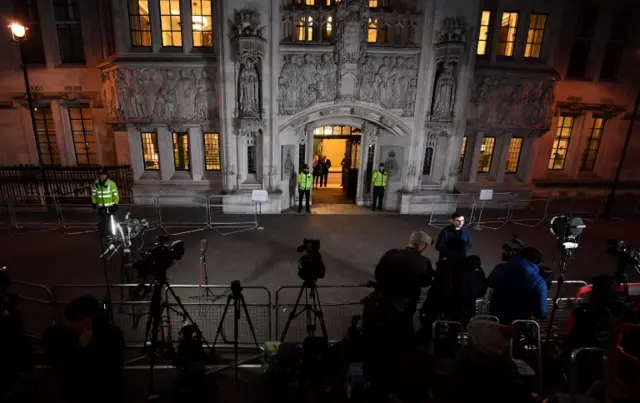 Image source, PA
Image source, PAFor what it's worth, bookmakers Wiliam Hill have lengthened the odds on the government winning the case from 12/5 to 3/1 following today's session.
They still think it is much more likely that the Supreme Court will uphold the High Court's ruling in Gina Miller and other campaigners favour.
But you know what they say about having a wager on a two-horse race...
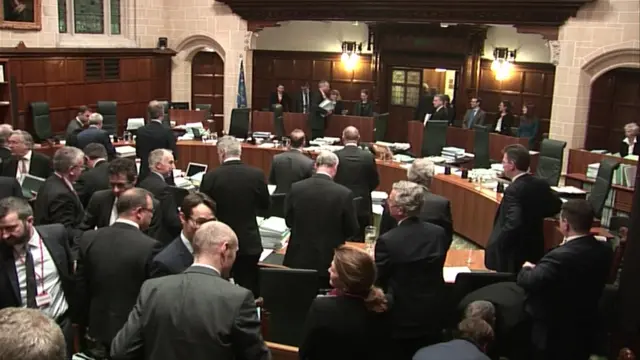 Image source, Supreme Court
Image source, Supreme CourtLord Pannick is subjected to some sustained questioning from Lord Carnwath about existing legal statutes and their connection to Article 50.
It would be fair to say he gave as good as he got and did not back down over his core argument that nothing in law justifies the use of executive power to commence the UK's exit from the EU.
As the exchange ends, Lord Pannick suggests the justices may "have had enough or more than enough" of his arguments for one day - a sure sign that all the participants are getting ready for the final bell.
Lord Pannick says he will need another 90 minutes to expand on his argument and Lord Neuberger says proceedings will be adjourned to resume tomorrow.
There is a brief interlude in which Lord Hodge says he would like a hard copy transcript of today's arguments and it is agreed that all 11 justices will have one on the basis of "all for one and one for all".
Now that would make a rather different Three Musketeers sequel...
 BBC News Channel
BBC News Channel
Jeremy Briar, barrister from Essex Court Chambers, spoke to BBC News as the proceedings closed for the day and was impressed with the performance.
"Lord Pannick is a theatrical, smooth and very brilliant orator," he said. "He is making very, very complicated concepts and cases really straightforward. You could almost just watch him and enjoy listening to him.
"This morning James Eadie, whilst he is an excellent advocate as well, was having a much tougher time and it was all getting rather more convoluted."
Mr Briar added that the indications from the judges this afternoon had "broadly indicated [they] had been finding favour with Lord Pannick's submissions" who is representing Gina Miller, rather than the QC representing the government.
Whether it is Strictly, Bake Off or Question Time, it seems nothing is worth following without a good hashtag and a pun. And they are coming thick and fast this afternoon thanks to the fortunate names of one of the QCs...
Allow X content?
This article contains content provided by X. We ask for your permission before anything is loaded, as they may be using cookies and other technologies. You may want to read X’s cookie policy, external and privacy policy, external before accepting. To view this content choose ‘accept and continue’.
Allow X content?
This article contains content provided by X. We ask for your permission before anything is loaded, as they may be using cookies and other technologies. You may want to read X’s cookie policy, external and privacy policy, external before accepting. To view this content choose ‘accept and continue’.
Allow X content?
This article contains content provided by X. We ask for your permission before anything is loaded, as they may be using cookies and other technologies. You may want to read X’s cookie policy, external and privacy policy, external before accepting. To view this content choose ‘accept and continue’.
Allow X content?
This article contains content provided by X. We ask for your permission before anything is loaded, as they may be using cookies and other technologies. You may want to read X’s cookie policy, external and privacy policy, external before accepting. To view this content choose ‘accept and continue’.
Allow X content?
This article contains content provided by X. We ask for your permission before anything is loaded, as they may be using cookies and other technologies. You may want to read X’s cookie policy, external and privacy policy, external before accepting. To view this content choose ‘accept and continue’.
 Laura Kuenssberg
Laura Kuenssberg
BBC political editor
Downing Street has accepted Labour's attempt to force the prime minister to publish a plan for Brexit before Article 50 is triggered.
But government sources are not committing Prime Minister Theresa May to publish any specific form of document on any specific timetable, apart from saying that it will be before Article 50.
And ministers are challenging Labour MPs and potential Tory rebels to back the timetable to trigger Article 50 by the end of March in return.
Sources also say by accepting Labour's amendment, the government is not agreeing to give MPs a vote before the process of leaving the EU begins.
 Dominic Casciani
Dominic Casciani
BBC Correspondent in Supreme Court
Here is the summary of the seven reasons that Lord Pannick gave for why he believed the government's case was wrong and the original High Court ruling backing his client should be upheld.
1: The 2015 referendum act doesn't give ministers prerogative to trigger Article 50 - doesn't mention it at all
2: While ministerial prerogative is used to enter into new treaties (such as EU membership) it can’t be used to change the UK constitution
3: Government must demonstrate Parliament has expressly handed over powers to ministers to supersede legislation. It hasn’t over Brexit.
4: Parliament did not intend the 1972 Act to create ministerial prerogative power to sweep away membership
5: Ministers can’t use prerogative power to frustrate legislation
6: None of the European Union-related acts created over 40 odd years give ministers power to trigger Article 50
7: Only an act of parliament can take away the rights linked to the EU that have been created since 1972 membership. “It is so obvious, so basic… These are matters for Parliament."
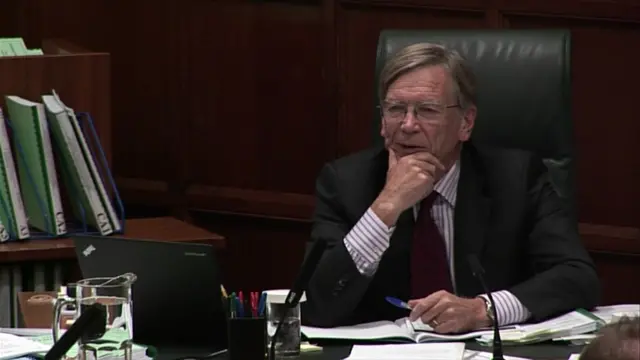 Image source, Supreme Court
Image source, Supreme CourtLord Carnwath says the 2008 Lisbon Treaty created a totally different and much clearer mechanism for leaving the EU - that's Article 50 - than existed before and suggests that Lord Pannick is spending rather too much time focusing on the original 1972 European Communities Act than on contemporary legislation and what that has to say about the process of Brexit.
But Lord Pannick insists the scheme of the 1972 Act has not changed since then - and it has to be amended for there to be any change in domestic law.
Breaking away from the Supreme Court for a moment, the BBC's political editor Laura Kuenssberg says the government has tabled an amendment to a Labour opposition motion to try and stave off a rebellion over their plans for Brexit in the Commons on Wednesday.
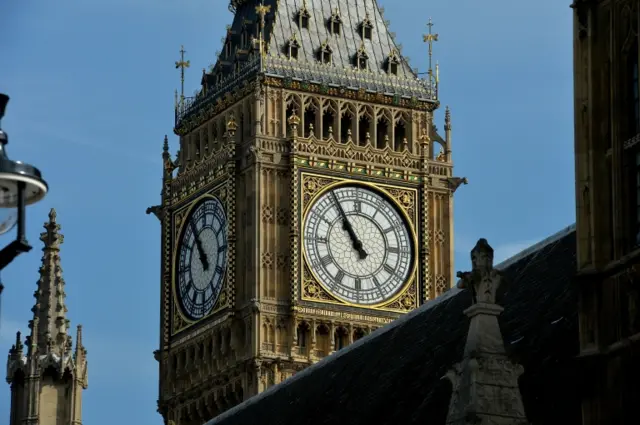 Image source, PA
Image source, PA"Parliament is sovereign and only Parliament can remove that which it has incorporated into domestic law," Lord Pannick says succinctly - adding that it is "highly implausible" that Parliament believed the whole body of rights created by EU accession could be "set at nought" by an act of executive power..
It is his belief that Parliament "regards itself as in charge in this area" in terms of its decision to include EU law into domestic law - with the profound "legal consequences" that this entailed.
Quote MessageHowever flexible our constitution, it cannot be bent so that ministers through the exercise of the prerogative can take away that which Parliament has created."
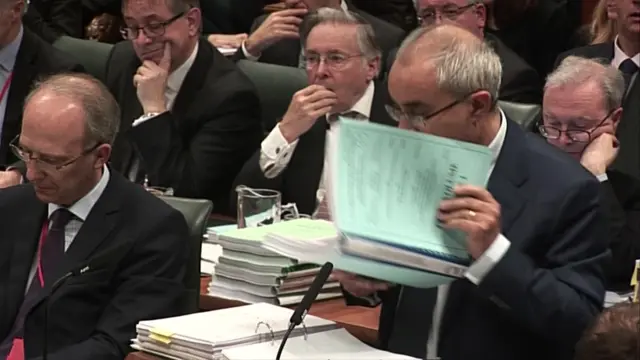 Image source, Supreme Court
Image source, Supreme CourtLord Pannick reads directly from last month's High Court ruling - which found in his client's favour - to back up his argument that Parliament never intended the government to use executive powers to tear up the 1972 European Communities Act either deliberately or through a process of "implied repeal".
After finishing, he remarks "I can't improve on that".
A Brexit deal will need to be reached by October 2018, EU negotiator Michel Barnier says.
Read More